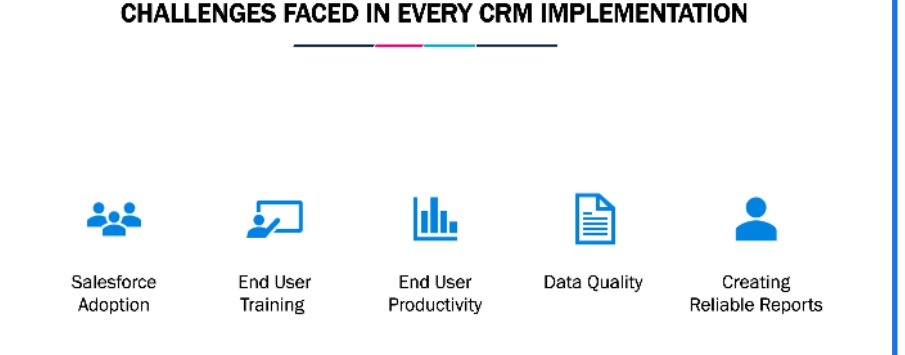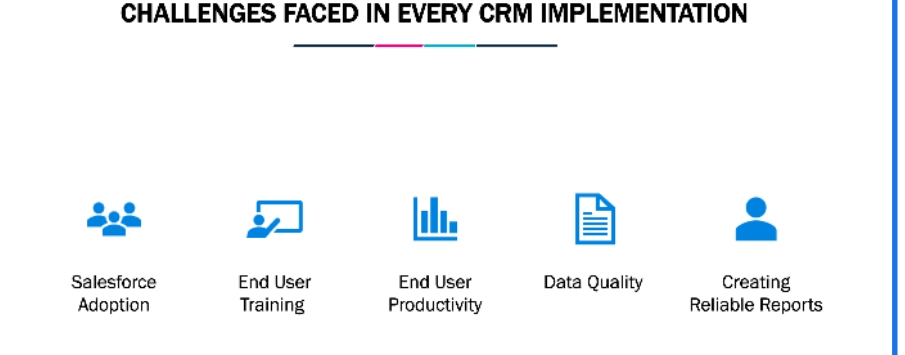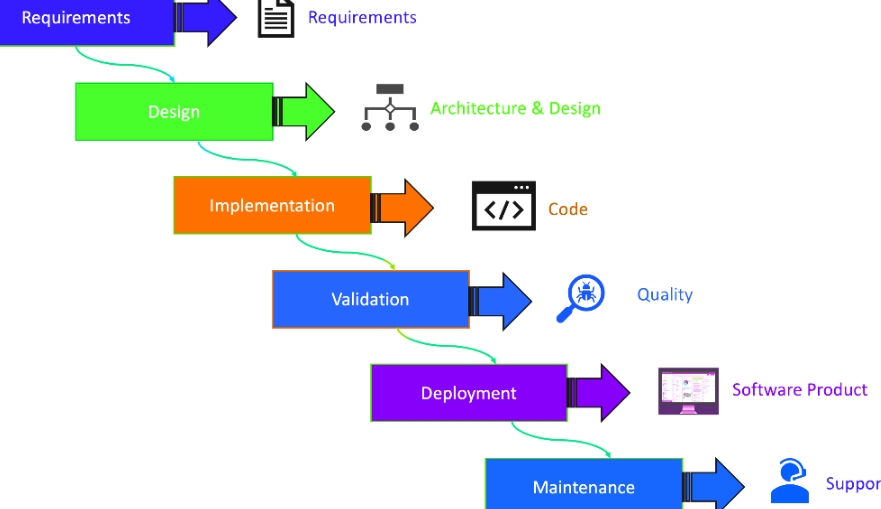Salesforce is a widely-used customer relationship management (CRM) software that helps organizations manage their customer interactions and streamline their sales processes.
However, implementing Salesforce is not always a straightforward process, and organizations can face a variety of challenges along the way. One way to make the Salesforce integration is to hire a Salesforce consultant to take over this task. In this blog, we will discuss some of the most common challenges organizations face when implementing Salesforce CRM and how to overcome them.
Few Challenges Faced in Implementing Salesforce CRM
Before implementing Salesforce, it’s imperative to understand the challenges, strengths and limitations faced during the implementation to avoid common roadblocks that delay ROI.
Here is a look at the major challenges organizations face while implementing Salesforce CRM.
Adoption challenges
One of the organization’s most significant challenges when implementing Salesforce CRM is getting employees to adopt the new system. Employees may resist change or feel overwhelmed by the new system’s complexity. To overcome this challenge, organizations need to invest in user training and communication to help employees understand the new system’s benefits and how to use it effectively. Providing incentives for using the system can also encourage adoption.
Data quality challenges
Data quality is critical for the success of any CRM implementation. Data quality can lead to accurate reporting, lost opportunities, and decreased customer satisfaction. Organizations need to ensure that the data in the new system is accurate, up-to-date, and relevant. This can be achieved by implementing data quality rules, cleaning and deduplicating data, and integrating data from other systems.

Source: Salesforce Ben
Integration challenges
Integrating Salesforce CRM with other systems can be a complex and time-consuming process. Organizations may face challenges integrating data from other systems, such as ERP (Enterprise Resource Planning) or Marketing Automation systems. It is essential to clearly understand the integration requirements and plan for integration in advance. Organizations can also use integration tools and services to simplify the integration process.
Customization challenges
Salesforce CRM is highly customizable, which can be a double-edged sword. On the one hand, customization can help organizations tailor the system to their specific needs. On the other hand, customization can lead to complexity, increasing the cost and time of implementation. It is essential to strike a balance between customization and simplicity. Organizations should identify their key requirements and prioritize customization accordingly.


Source: Dhruvsoft
Reporting challenges
Reporting is a critical component of any CRM implementation. Organizations need access to accurate and relevant data to make informed decisions. However, reporting can be challenging if the data needs to be organized in a way that makes sense. It is important to plan for reporting requirements in advance and organize the data to facilitate reporting. Organizations can also use reporting tools and services to simplify the reporting process.
Security and privacy challenges
Security and privacy are critical considerations for any CRM implementation. It is vital to clearly understand the security and privacy requirements and implement appropriate security measures and policies. Organizations must ensure that customer data is secure and comply with applicable privacy regulations. This can be a challenge, especially for organizations that operate in multiple jurisdictions with different privacy regulations.
Scalability challenges
Scalability is a critical consideration for any CRM implementation. Organizations need to ensure that the system can handle increased volumes of data and users as the business grows. This can be a challenge, especially for organizations that experience rapid growth. It is important to plan for scalability and implement a scalable architecture that can grow with the business.
Cost challenges
Finally, the cost is a critical consideration for any CRM implementation. Implementing Salesforce CRM can be expensive, especially for small and medium-sized businesses. Organizations need to have a clear understanding of the costs involved and to plan for them in advance. It is important to balance the cost of implementation with the expected benefits and ROI (Return on Investment).
How to overcome challenges faced in implementing salesforce CRM
Implementing Salesforce CRM can be a daunting task for any organization, especially if they are not prepared for the challenges that may arise during the process. Below are some tips to help overcome these challenges and ensure a successful implementation.
- Define your goals: It is essential to define clear goals for your Salesforce implementation project. This will help you prioritize the features and functionalities you need to achieve those goals, which in turn will help you avoid scope creep and stay focused.
- Get executive buy-in: Getting buy-in from top-level executives is crucial for a successful Salesforce implementation. They can help secure the necessary resources and budget to complete the project, as well as provide support to the project team throughout the process.
- Engage your users: Salesforce is a user-centric platform, and user adoption is critical for success. Engage your users early in the process, involve them in decision-making, and provide them with the necessary training and support to ensure they are comfortable using the new system.
- Clean up your data: Before importing your data into Salesforce, it’s crucial to clean it up and ensure its accuracy. This will help prevent data duplication and ensure a smooth transition to the new system.
- Customize with caution: Salesforce is highly customizable, but too much customization can cause issues down the road. Before making any customizations, evaluate if it aligns with your goals and if it’s necessary. Additionally, too many customizations can make it challenging to maintain the system, so it’s essential to strike a balance.
- Test, test, test: It’s crucial to test the system thoroughly before going live to ensure it works as intended. This includes testing different scenarios, processes, and integrations to identify and fix any issues before they become critical.
- Provide ongoing support: Providing ongoing support after the implementation is critical to ensure user adoption and system maintenance. This includes providing training, answering user questions, and addressing any issues that arise.
Conclusion
In conclusion, implementing Salesforce CRM can be a complex process, but by addressing these common challenges, organizations can ensure a successful implementation and reap the platform’s benefits. By focusing on user adoption, data quality, integration, customization, cost, and change management, organizations can create a more efficient and effective sales process, leading to increased productivity and revenue.







